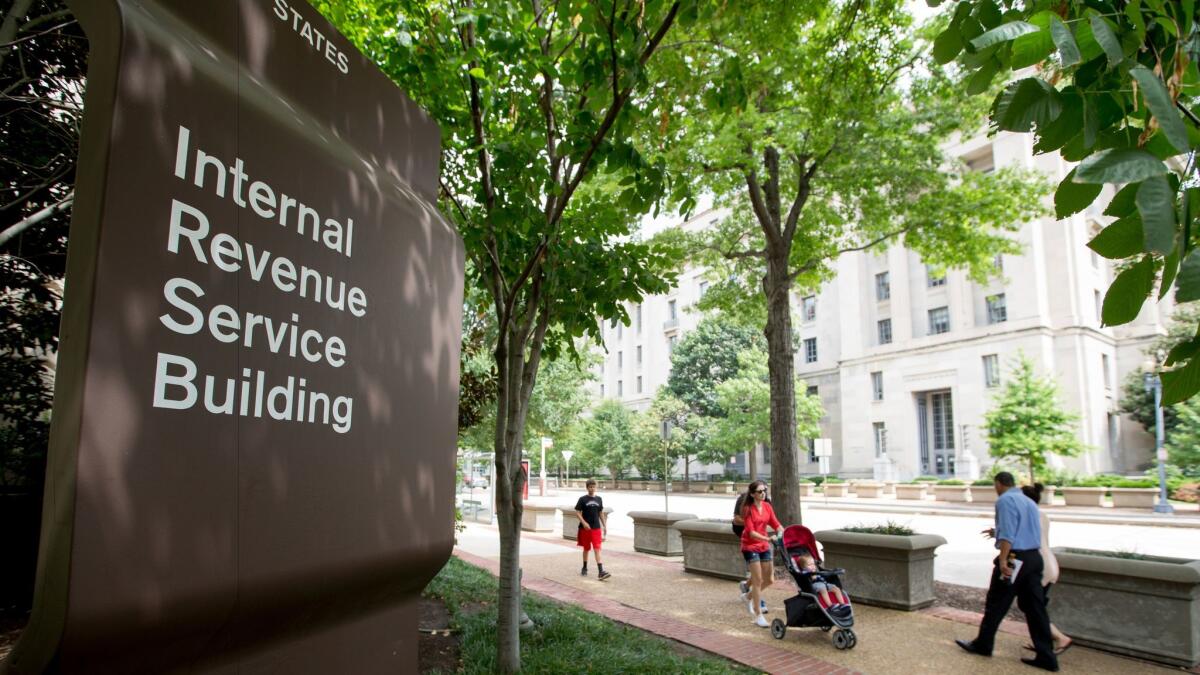Op-Ed: Two tax systems. One for the likes of Trump

Most Americans were outraged to learn that President Trump paid $750 in federal income taxes in 2016 and 2017, according to an examination of Trump’s tax returns by the New York Times. Many questioned how a self-proclaimed billionaire could legally pay such minuscule amounts — and no taxes at all in many preceding years — and get away with it.
The answer isn’t comforting. Trump could have engineered his finances to engage in monumental tax avoidance — which is legal. Or he could have skated past the gray area of tax avoidance into tax fraud.
He has had tax trouble before. He lost two tax appeals in the 1990s before administrative law judges involving his 1984 New York state and city tax returns in which he claimed more than $600,000 in tax deductions but didn’t have receipts or documentation. Trump now appears to be under criminal investigation by the Manhattan district attorney’s office for bank and insurance fraud, which could well spill into a tax fraud investigation. Trump is trying to block that grand jury from getting access to records held by his accountants, Mazars USA.
Whether the IRS will investigate Trump’s returns for possible criminal violations isn’t clear. What is clear is that the federal government has pretty much stopped enforcing the tax laws, especially when it comes to people like Trump who own businesses.
Last year, the IRS referred only 1,824 tax fraud cases to the Justice Department for prosecution, with only 530 convictions in which tax fraud was the primary charge. That’s roughly one conviction for every 290,000 tax returns filed.
Congress has defunded the tax police. Since 2010, the number of tax returns has grown about 8%, but the number of IRS revenue agents, as auditors are called, has been cut 35%, criminal investigators 27% and the agency’s total staffing by 22%. Any cost-benefit analysis would show the folly. Auditors of the biggest companies, who make at most $170,000 per year, each on average found $22 million of taxes owed before Congress began cutting staff in 2010.
The tax police are so overwhelmed that they have no plans to pursue more than a half million high-income Americans who didn’t file tax returns from 2014 through 2016 and owe billions of dollars to our government, the service’s inspector general reported in May.
In truth, there’s little need to investigate the vast majority of American taxpayers — workers, pensioners and stock investors — because how much they earn is reported to the IRS by the sources providing them that income. Under the 2017 tax law changes Trump pushed through, only 11% of individuals benefit from itemizing deductions like gifts to charity so that limits potential cheating.
But the rules for Trump and other business owners are very different. Congress trusts these people to fully report their income, deduct only what is allowed and pay what they owe. There is little to no verification of the income received by business owners. The taxpayer advocate, the IRS official whose job is to look out for taxpayers, has called sole proprietorships the last great area of tax cheating.
Congress has also handcuffed the tax police when it comes to investigations. Under a 1998 law, for example, the IRS can no longer conduct so-called lifestyle audits. That’s when someone lives in a mansion or owns a jet but reports an income that would only support renting an apartment. Auditors must also get higher management approval for many penalties and face strict time limits to finish.
On the corporate side, Congress requires the IRS to tell corporations in advance exactly what issues will be examined. If tax agents discover something else that seems suspicious, they are barred from pursuing it unless the matter is unquestionably criminal fraud.
Audits of the biggest corporations are at half the already low levels of a decade ago.
Our real concern as taxpayers should be that Congress has created two income tax systems, separate and unequal. Under one system, most of us, who are employees, pay all our taxes, which are taken out before we get our money. The structure of the tax withholding system makes it very hard to cheat.
The other system, built for business owners like Trump, operates on the honor system. Cheating is supposed to be controlled largely because that class of taxpayers fear that IRS auditors will be checking. But deterrence cannot work when audits conducted of people in that group is less than 3%, down from 8% a decade ago and the risk of criminal prosecution is essentially zero.
Trump’s failure to pay taxes is a disgrace. But no more so than a federal tax system that makes it possible for him and millions of other taxpayers to avoid paying what they should rightly owe.
David Cay Johnston, a former Times reporter, is co-founder of the nonprofit news service DCReport.org and teaches at Syracuse University College of Law.
More to Read
A cure for the common opinion
Get thought-provoking perspectives with our weekly newsletter.
You may occasionally receive promotional content from the Los Angeles Times.







